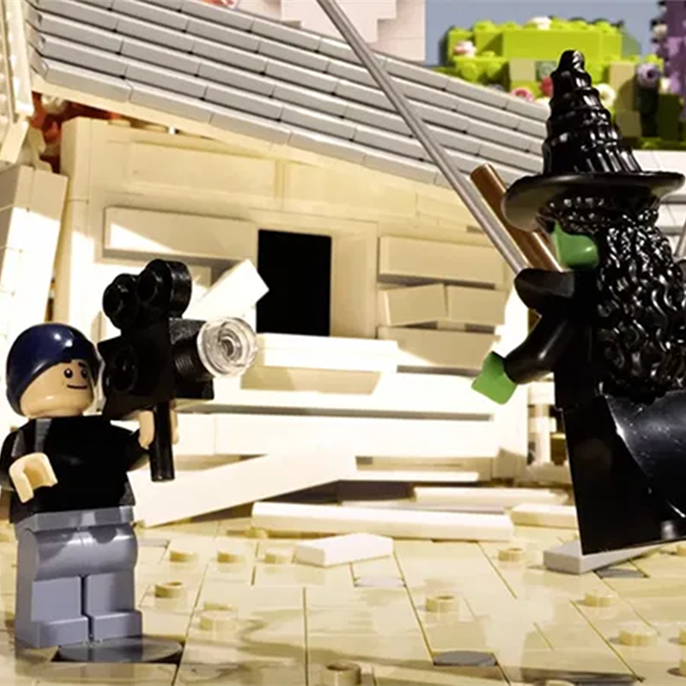In its inaugural season, "The Marvelous Mrs. Maisel" has delivered a diverse array of emotions — laughter, awe, and even a hint of exasperation. Yet, one aspect it notably lacked was the element of surprise. Despite Midge's initial doubts about pursuing comedy, it seemed inevitable that with her unwavering dedication, relentless hard work, and Susie's seasoned guidance, she would eventually ascend to the heights of comedy greatness. However, this particular episode flips the script. Not due to any unpredictable twist of fate, but because Midge herself is the one rewriting her destiny.
"Put That on Your Plate!" kicks off with the incarnation of Midge that enthusiasts have eagerly anticipated since the show's inception: She's finally stepping into the spotlight, delivering jokes, and paying her dues as a budding comic. A masterfully crafted montage showcases the evolution of three of her jokes, from the fleeting spark of inspiration to a rough, half-formed concept, and ultimately, to a genuinely hilarious punchline. Susie stands on the sidelines, watching intently, eagerly awaiting each joke to come to full fruition. When Midge finally nails a tight ten-minute set, Susie's joy is so profound that she can barely contain her tears.

The next chapter involves venturing beyond the cozy confines of the Gaslight and taking Midge to the heart of the city, spanning all five boroughs (albeit with Susie's candid confession that "by 'all five boroughs,' I really mean Manhattan, and not so much of Staten Island, Queens, the Bronx, or even Brooklyn"). Undeterred, Susie once again barges into a male-dominated domain to secure a favor from her buddy and renowned comedy agent, Harry, whom we last encountered at the Friars Club. He agrees to potentially offer Midge an opening spot for one of his prized clients, the legendary vaudevillian Sophie Lennon, portrayed brilliantly by Jane Lynch. (Casting director Cindy Tolan deserves praise for her impeccable choices, filling these episodes with an array of stellar actors who breathe life into the period setting.)
Although Lennon wasn't a flesh-and-blood figure, she stands as a potent symbol of the female comics of a bygone era. Imagine a bawdy yet wholesome cartoon of a robust and sassy housewife from Queens, whose forte lies in the kind of jokes where she chases her husband with a frying pan, just like the ones Herb Smith crafted for Midge on index cards. Despite her earthy, unpolished charm harking back to an earlier time, Lynch ensures we witness her innate stage prowess. Midge is undeniably captivated, for Sophie truly shines as a star.
However, Sophie is also a consummate liar, and a masterful one at that. When Midge ventures into her abode, she encounters a stark contrast: a vast mansion, staffed by stiff-upper-lip servants under the command of an elegant, well-groomed Sophie. She's actually a fabulously wealthy aesthete, whose lifestyle is as regimented as her diet of raw lemon slices. A lesser actress would fail to breathe life into such a drastic character shift, but Lynch skillfully weaves bits of the false Sophie into the authentic one, allowing glimpses of bawdiness and warmth to peek through her severe facade. Sophie might initially appear as a frosty queen, but there's a subtle, haunting aspect to her. The role of the imperious matron is merely a facade, and Sophie has lost track of where she ends and her characters begin.
Her counsel is stark: No one cares to witness Midge's self-portrayal or chuckle at a pretty face. Her shtick may captivate the gin-fueled hipsters of the Village, but it won't resonate with the dog-food-purchasing masses in Topeka. She urges Midge to cultivate a broader, less polished persona, and when such sage advice comes from a woman who dispenses fur coats as casually as after-dinner mints, it deserves heed.
Yet, Midge defies this wisdom. During her showcase at the Gaslight, intended to showcase Harry's talents, she abandons the script she had crafted with care. Instead, she unleashes a barrage of truths about Sophie's hypocrisy and society's obsession with restraining women and forcing them to hide their authentic selves. It's a shocking scene, fraught with complex implications. Is Midge aware of the potential harm she's inflicting by alienating Harry, who is not only offended by the attack on his client but vows vengeance on Susie? Does she comprehend the opportunities she's forfeiting in pursuit of authenticity, or is she as impulsive as she was in court, unable to resist using the stage as a catharsis?
In an era where such unfettered honesty wouldn't appeal to the dog-food-buying masses in Topeka, who holds the truth? Midge, for staying true to her inner self? Sophie, for realizing the limitations of a world that doesn't operate as such? Or Susie, who seeks to temper Midge's raw edges in search of a balanced path? It's a pivotal moment that poses profound questions about society's expectations of comedic women, a query whose answers are elusive indeed.
However, regarding the "frustrating" aspect, the aforementioned discussions merely constitute half the narrative. Alas, there's scarce time to delve deeper into these issues, as we're compelled to immerse ourselves in Joel's sorrowful saga of a breakup with Penny, his return to his parents' abode, and his self-indulgent despair. Similarly, Abe's comedy of errors ensues when he inexplicably brings a divorce lawyer to dinner, and Rose's indignation boils over upon learning that Midge rejected Joel's return. Midge's dual existences couldn't be more disparate, and at this juncture, my heart yearns to delve into the complex matters of femininity, performance, and art in the downtown milieu.
Granted, Midge's reaction to Sophie might seem like wistful retrospection, particularly stemming from a woman who still adheres to patriarchal beauty ideals. Nevertheless, the mystery surrounding her emotions and the motivations behind her choices—largely due to Mrs. Maisel's preoccupation with male-centric plotlines—is as maddening as Sophie's influence on Midge. This show teeters on the brink of authenticity, intrigue, and rawness, yet it remains sheltered beneath the comfort of banal frying-pan jokes.

